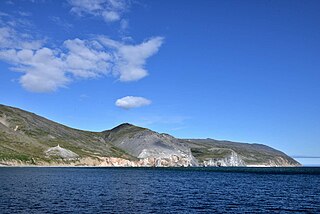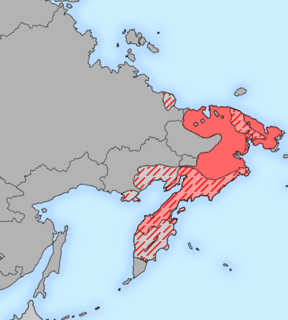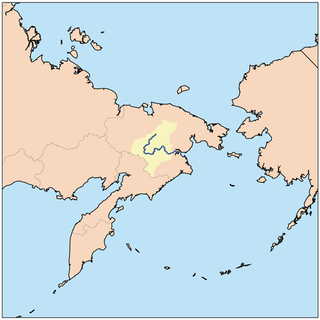Related Research Articles

The Siberian Husky is a medium-sized working sled dog breed. The breed belongs to the Spitz genetic family. It is recognizable by its thickly furred double coat, erect triangular ears, and distinctive markings, and is smaller than the similar-looking Alaskan Malamute.

The Chukchi, or Chukchee, are an indigenous people inhabiting the Chukchi Peninsula, the shores of the Chukchi Sea and the Bering Sea region of the Arctic Ocean within the Russian Federation. They speak the Chukchi language. The Chukchi originated from the people living around the Okhotsk Sea. According to recent genomic research, the Chukchi are the closest Asiatic relatives of the indigenous peoples of the Americas as well as of the Ainu people.

Cape Dezhnyov or Cape Dezhnev, formerly known as East Cape or Cape Vostochny, is a cape that forms the easternmost mainland point of Asia. It is located on the Chukchi Peninsula in the very sparsely populated Chukotka Autonomous Okrug of Russia. This cape is located between the Chukchi Sea and the Bering Strait, 82 kilometres (51 mi) across from Cape Prince of Wales in Alaska; the Bering Strait is delimited by the two capes. The Diomede Islands and Fairway Rock are located in the midst of the strait.

Chukchi, also known as Chukot, is a Chukotko–Kamchatkan language spoken by the Chukchi people in the easternmost extremity of Siberia, mainly in Chukotka Autonomous Okrug. According to the 2002 census, about 7,000 of the 15,700 Chukchi people speak Chukchi; knowledge of the language is decreasing, and most Chukchi now speak Russian.

Chukotka Autonomous Okrug or Chukotka (Чукотка) is the easternmost federal subject in Russia. It is geographically located in the Far East region of the country, and is administratively part of the Far Eastern Federal District. Chukotka is the 2nd-least-populated federal subject at 50,526 (2010) and the least densely populated.
Chukchi may refer to:

A Yaranga is a tent-like traditional mobile home of some nomadic Northern indigenous peoples of Russia, such as Chukchi and Siberian Yupik.

The Chukotko-Kamchatkan or Chukchi–Kamchatkan languages are a language family of extreme northeastern Siberia. Its speakers traditionally were indigenous hunter-gatherers and reindeer-herders. Chukotko-Kamchatkan is endangered. The Kamchatkan branch is moribund, represented only by Western Itelmen, with only 4 or 5 elderly speakers left. The Chukotkan branch had close to 7,000 speakers left, with a reported total ethnic population of 25,000.

Chukchi Sea, sometimes referred to as the Chuuk Sea, Chukotsk Sea or the Sea of Chukotsk, is a marginal sea of the Arctic Ocean. It is bounded on the west by the Long Strait, off Wrangel Island, and in the east by Point Barrow, Alaska, beyond which lies the Beaufort Sea. The Bering Strait forms its southernmost limit and connects it to the Bering Sea and the Pacific Ocean. The principal port on the Chukchi Sea is Uelen in Russia. The International Date Line crosses the Chukchi Sea from northwest to southeast. It is displaced eastwards to avoid Wrangel Island as well as the Chukotka Autonomous Okrug on the Russian mainland.

The Chukchi Peninsula, at about 66° N 172° W, is the easternmost peninsula of Asia. Its eastern end is at Cape Dezhnev near the village of Uelen. The Chukotka Mountains are located in the central/western part of the peninsula, which is bounded by the Chukchi Sea to the north, the Bering Sea to the south, and the Bering Strait to the east, where at its easternmost point it is only about 60 km (37 mi) from Seward Peninsula in Alaska; this is the smallest distance between the land masses of Eurasia and North America. The peninsula is part of Chukotka Autonomous Okrug of Russia.
Chuvans are one of the forty or so "Indigenous small-numbered peoples of the North, Siberia and the Far East" recognized by the Russian government. Most Chuvans today live within Chukotka Autonomous Okrug in the far northeast of Russia. Based on first-hand field research by several ethnographers in the 1990s, people who self-identify as Chuvans seem to do so by living in small villages and in the tundra in areas that are primarily associated with reindeer herding.

Koryak is a Chukotko-Kamchatkan language spoken by about 1,700 people as of 2010 in the easternmost extremity of Siberia, mainly in Koryak Okrug. It is mostly spoken by Koryaks. Its close relative, the Chukchi language, is spoken by about three times that number. The language together with Chukchi, Kerek, Alutor and Itelmen forms the Chukotko-Kamchatkan language family. Its native name in Koryak is нымылан nymylan, but variants of the Russian "Koryak" name are most commonly used in English and other languages.
Kereks are an ethnic group of people in Russia. According to the 2010 census, there were only 4 people registered as ethnic Kereks in Russia. According to the 2002 census, there were 8 people registered as Kereks. According to the 1897 census, there were 102 Kereks. During the twentieth century, Kereks were almost completely assimilated into the Chukchi people.
Chukotkan is a dialect cluster that forms one branch of the Chukotko-Kamchatkan language family. It is spoken in two autonomous regions at the extreme northeast of Russia, bounded on the east by the Pacific and on the north by the Arctic.

The Russian conquest of Siberia took place in the 16th and 17th centuries, when the Khanate of Sibir became a loose political structure of vassalages that were being undermined by the activities of Russian explorers. Although outnumbered, the Russians pressured the various family-based tribes into changing their loyalties and establishing distant forts from which they conducted raids. To counter this, Kuchum Khan attempted to centralize his rule by imposing Islam on his subjects and reforming his tax-collecting apparatus.

Siberia, including the Russian Far East, geographicaly, is the Asiatic part of Russia. As a result of the Slavic-Russian conquest of Siberia and of the subsequent population movements during the Soviet era (1917-1991), the demographics of Siberia today is dominated by speakers of Russian. However there remains a slowly increasing number of indigenous groups, between them, accounting for about 10% of the total Siberian population, some of which are closely genetically related to indigenous peoples of the Americas.

Vladimir Ivanovich Voronin was a Soviet Navy captain, born in Sumsky Posad, in the present Republic of Karelia, Russia. In 1932 he commanded the expedition of the Soviet icebreaker A. Sibiryakov which made the first successful crossing of the Northern Sea Route in a single navigation without wintering. This voyage was organized by the All-Union Arctic Institute.
The Chukchi Sea Shelf or Chukchi Shelf is the westernmost part of the continental shelf of the United States and the easternmost part of the continental shelf of Russia. Within this shelf, the 50-mile Chukchi Corridor acts as a passageway for one of the largest marine mammal migrations in the world.

El with hook is a letter of the Cyrillic script. Its form is derived from the Cyrillic letter El (Л л) by adding a hook to the bottom of the right leg.

Anadyrsk was an important Russian ostrog in far northeastern Siberia from 1649 to 1764. It was on the Anadyr River, near the head of small-boat navigation, about 300 miles upstream, 12 miles northeast of the present Markovo.
References
- ↑ Waldemar Bogoras (1909). The Chukchee. E.J. Brill Limited. p. 306.